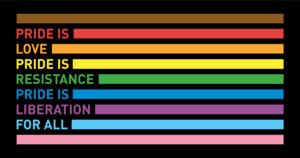Join our Virtual Pride July 2, 2023! https://callingupjustice.com/accessible-virtual-pride-2023
The history of LGBTQ+ pride, starting with Marsha P. Johnson and extending to the present day, is a testament to the ongoing struggle for equality, visibility, and acceptance for the LGBTQ+ community. Let’s continue the timeline:
1970s-1980s: Following the Stonewall Riots, LGBTQ+ activism gained momentum. Pride marches and parades became annual events in major cities worldwide. These events provided spaces for LGBTQ+ individuals to come together, celebrate their identities, and demand equal rights and protections.
1980s-1990s: The LGBTQ+ community faced the devastating impact of the HIV/AIDS epidemic, which disproportionately affected gay and bisexual men. Activism and advocacy efforts focused on raising awareness, promoting safer sex practices, and demanding government action to address the crisis. ACT UP (AIDS Coalition to Unleash Power) and other organizations played a crucial role in this fight.
1990s-2000s: LGBTQ+ visibility and rights continued to advance, with significant milestones such as the removal of homosexuality from the American Psychiatric Association’s list of mental disorders in 1973. In 1996, the first openly gay and lesbian characters appeared on mainstream television in the U.S., contributing to increased LGBTQ+ representation.
2000s-2010s: The push for marriage equality gained traction worldwide. In 2001, the Netherlands became the first country to legalize same-sex marriage, followed by several other nations. In the United States, the Supreme Court’s landmark ruling in Obergefell v. Hodges in 2015 legalized same-sex marriage nationwide. This marked a significant victory for LGBTQ+ rights.
Additionally, transgender rights and visibility became more prominent. The fight for transgender rights encompassed issues such as legal recognition, access to healthcare, and protection against discrimination. Transgender activists and advocates, including Janet Mock and Laverne Cox, used their platforms to raise awareness and push for change.
Present day: LGBTQ+ Pride events have grown in scale and visibility, with parades, marches, and celebrations taking place worldwide during the month of June, designated as Pride Month. These events continue to serve as platforms for advocating for LGBTQ+ rights, raising awareness about LGBTQ+ issues, and promoting inclusivity and acceptance. They are under increasing attack from anti-LGBTQ rightwing forces
The LGBTQ+ community continues to face challenges, including discrimination, violence, and ongoing struggles for equal rights, particularly for transgender and non-binary individuals, people of color, and those living in countries with restrictive laws. Intersectional activism, recognizing and addressing the unique experiences and needs of different marginalized groups within the LGBTQ+ community, has become increasingly important.

